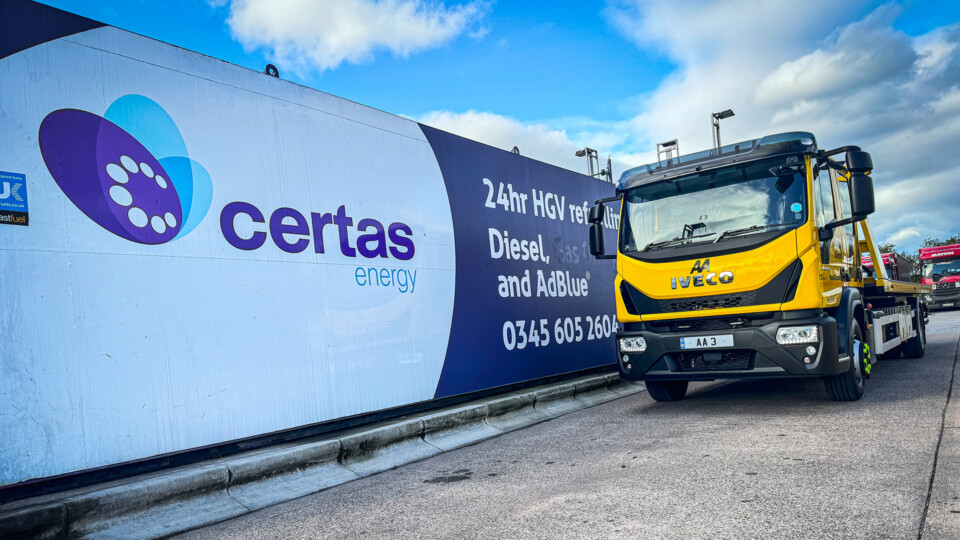One year on – Our AA fleet celebrates HVO truck trial progress
As part of our award-winning, innovative “test and scale” approach to fleet decarbonisation, we have expanded our trial of hydrogenated vegetable oil (HVO) from three to 15 vehicles. This allows us to further evaluate the viability of this alternative fuel in dealing with roadside recovery demands in real-world settings.
If this trial extension proves successful, we will increase the number of HVO-powered vehicles to 27 later this year, meaning over ten per cent of our flatbed recovery trucks will be fuelled by HVO. With a diverse fleet of over 3,000 vehicles – responsible for 95% of our scope 1 and 2 emissions – decarbonisation is crucial in achieving our net zero target by 2035.
Over the past 12 months, our trial has used more than 66,000 litres of HVO, covering over 210,000 miles. By switching to HVO, we have achieved a 95% reduction in carbon emissions at the point of use, saving 165 tonnes of CO2e compared to equivalent diesel vehicles. If our second-year trial vehicles deliver similar results, we could see a total reduction of over 700 tonnes of CO2e.
Beyond emissions and fuel savings, our Fleet Engineering team is confident that HVO could lead to lower maintenance costs. HVO burns cleaner than diesel, significantly reducing the number of Diesel Particulate Filter (DPF) regenerations required, which in turn could extend vehicle lifespan and reduce servicing needs.
Another major advantage of HVO is that it requires no vehicle modifications. If fleets running on HVO face supply challenges, they can simply switch to diesel until sufficient HVO stock is available, ensuring operational continuity without added costs.
Roadside assistance and recovery are at the heart of what we do, and we have complex vehicle needs, including specific towing requirements that many current EVs – particularly vans – cannot yet support. This is why we are leading the way with a sector-first programme of alternative fuel trials, ensuring we find the best solutions for our fleet. HVO-powered trucks form an important part of this wider initiative.
Duncan Webb, our Head of Fleet, said:
“Decarbonisation is a business priority for us, and we are committed to reaching net zero by 2035. To achieve this, innovation and exploration within our fleet are essential.
“Our HVO trial is just one example of how we’re working closely with manufacturers and suppliers to find solutions that meet the demands of roadside recovery while reducing our carbon footprint. Already, HVO is proving to be a valuable contributor to our sustainability goals while maintaining the high levels of performance our customers expect.
“We’ve seen fantastic results in terms of miles per gallon and a 95% emissions reduction. With no impact on operational performance, improving HVO availability, a falling price premium, and promising signs of fuel efficiency gains, we’re eager to extend our trials. HVO is becoming an exciting part of our alternative fuel ‘test and scale’ programme, and I’m looking forward to seeing what the next six months bring.”
HVO is an innovative biofuel made from recycled vegetable oil that can be used in standard diesel engines. Since January 2024, we have had three fully operational HVO-powered trucks in Greater Manchester, run in partnership with Certas Energy using its HGV refuelling sites.
Our expansion of the HVO trial follows another significant milestone: our first major trial of plug-in vans for roadside recovery. We have added 15 battery electric vehicles (BEVs) and 15 plug-in hybrid Ford Transit Customs to our roadside service fleet, deploying them across the country. As part of this initiative, all participating patrols will have home chargers installed, supported by Rightcharge.
By taking a bold and proactive approach to fleet decarbonisation, we continue to lead the way in sustainable roadside recovery. We remain committed to finding innovative, effective solutions to reduce our environmental impact while maintaining the exceptional service our customers rely on.

